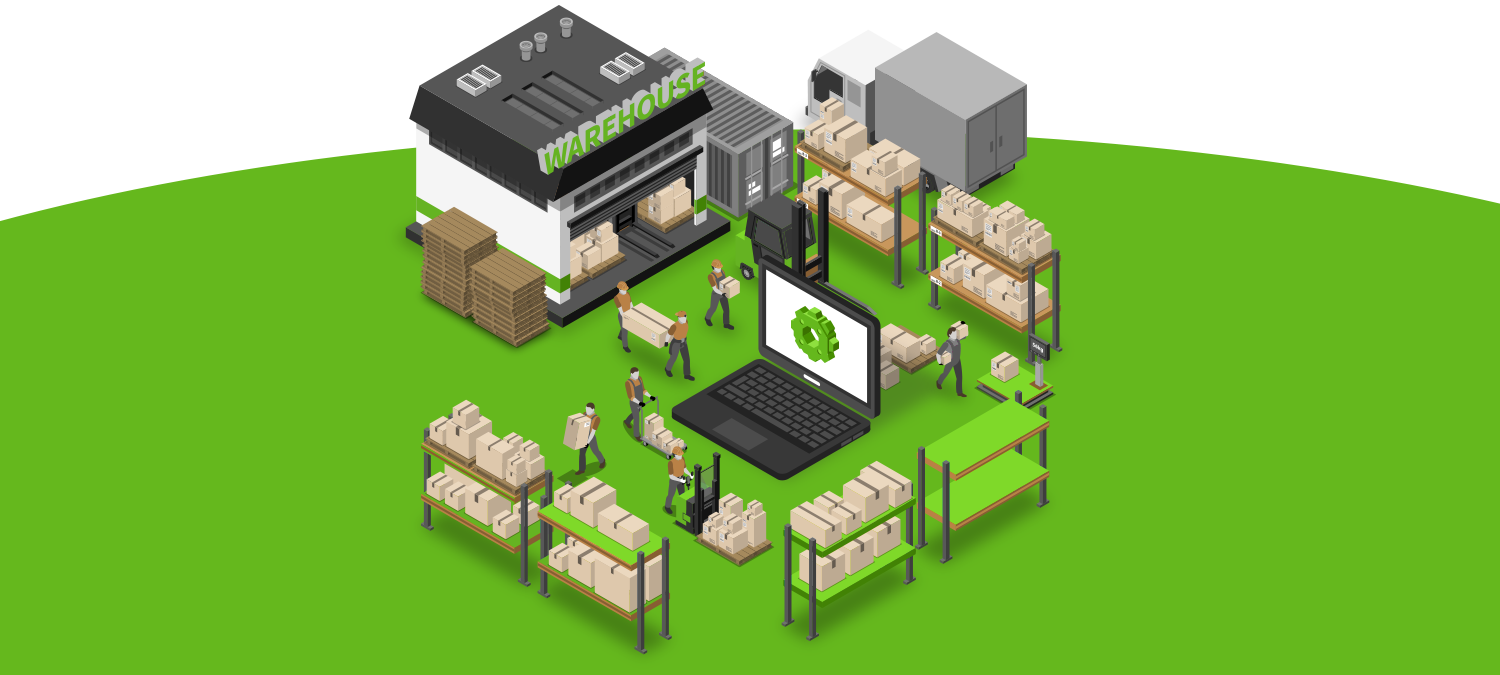Technologies have revolutionized the concept of warehouse management, replacing outdated paper processes and spreadsheets with more efficient and accurate solutions. For companies aiming for growth and increased revenue, optimizing warehouse operations becomes a necessity. A Warehouse management system (WMS) is an integral component of this process. Based on statistical data from 2018, when the adoption of WMS first exceeded 90%, the majority of warehouses and order fulfillment centers recognized this significance.
However, before implementing WMS, it is important to understand the types of systems, their features, and benefits. In this article, we will explore 4 types of warehouse management systems that can enhance the financial efficiency of your warehouse and ensure a seamless supply chain.
- What Is a Warehouse Management System?
- Main Types of Warehouse Management Systems
- Which Type of WMS System to Choose for Your Business?
- Frequently Asked Questions
What Is a Warehouse Management System?
A warehouse management system (WMS) is an integrated set of software and hardware tools designed to optimize and automate warehouse operations. The primary goal of a WMS is the efficient management of all aspects of warehouse operations, from receiving goods to shipping them to the end consumer.
Modern WMS systems integrate with advanced tools such as barcode scanning, RFID tags, automated picking systems, and data management. They contribute to efficient and accurate warehouse resource management.
Warehouse management systems are widely used in various industries, from retail and manufacturing to logistics and distribution. Any company with inventory can benefit from its implementation by:
- Optimizing the processes of receiving, storing, and shipping goods.
- Efficiently distributing goods within the warehouse.
- Avoiding stock shortages or obsolete inventory.
- Speeding up the order fulfillment process.
- Reducing the likelihood of errors associated with manual processing.
- Simplifying strategic decision-making and procurement planning.
In the end, implementing a warehouse management system will allow you to reduce operational costs, increase customer satisfaction, and enhance the overall profitability of the company.
Main Types of Warehouse Management Systems
Currently, companies utilize different types of warehouse management systems that best suit their requirements. This can range from a localized system designed for small businesses to a high-tech, scalable solution for large corporations. The four main types of warehouse management systems that are most commonly used include: standalone system, cloud-based system, integrated with ERP, and supply chain module. Let’s explore each of them in more detail.
1. Standalone system
Standalone warehouse management systems offer a convenient and affordable solution for small businesses with limited resources. They provide basic capabilities necessary for efficient inventory management. This includes tracking receipts and shipments, inventory tracking, picking processes, packing, and returns.
The simplicity and affordability of standalone systems often make them a preferred choice for startups, where a quick start and basic features for warehouse management are crucial. However, as businesses grow and warehouse operations become more complex, companies may need to transition to more powerful and feature-rich WMS solutions.
Advantages of a standalone warehouse management system:
- Standalone systems are designed exclusively to streamline and optimize warehouse operations.
- These systems have an intuitive user interface and basic functions that enable simple and straightforward implementation.
- Standalone systems are more financially accessible.
Disadvantages of a standalone WMS system:
- Standalone systems may be insufficiently functional for large enterprises or those whose warehouse management requirements demand more complex integrations.
2. Cloud-based system
Unlike local systems, cloud-based WMS operate on remote servers. Centralized data storage contributes to more efficient inventory information management and decision-making process optimization. One of its key advantages is the accessibility of data from any part of the world. This is particularly crucial in the modern business landscape, which demands mobility and prompt decision-making.
Such systems feature a high degree of automation. They update automatically and often provide opportunities for integration with other cloud services. With a cloud-based warehouse management system, companies gain comprehensive and highly effective tools for managing the entire supply chain.
Advantages of the cloud-based warehouse management system:
- Centralized data storage in the cloud provides a unified and up-to-date source of information, facilitating more efficient inventory management and strategic decision-making.
- Users can easily access the cloud-based system from anywhere with an internet connection.
- Cloud-based warehouse management systems offer opportunities for integration with other cloud services, such as ecommerce platforms or transportation systems.
- Advanced cloud systems can ensure high standards of data security and encryption.
- The system does not require investments in maintenance.
Disadvantages of the cloud-based WMS systems:
- The use of a cloud-based system requires a stable internet connection. Network issues can slow down access to data and hinder operations.
- In the case of cloud systems, technical support, updates, and maintenance are handled by the provider. You won’t have the ability to independently control technical aspects of the system.
3. ERP Module
The warehouse management module in an ERP system is an integrated part of comprehensive software. In addition to warehouse management, the system includes production, financial accounting, order management, and other key aspects of business processes. The ERP module can provide a centralized approach to managing all aspects of inventory and warehouse operations.
Companies can have full visibility and control over the interaction between various business functions. This allows them to create more flexible inventory management strategies, improve forecasting accuracy, and ensure consistency across the entire supply chain.
Advantages of the ERP system:
- The ERP module integrates various functional areas of the enterprise into a unified system. This allows for more efficient coordination of activities and enhances interaction between different departments.
- Integration with order management, production, and logistics modules enables the optimization of the entire supply chain, reducing lead times and enhancing overall efficiency.
Disadvantages of the ERP system:
- Implementing an ERP system can be a complex and costly process. It requires careful planning, staff training, and a reevaluation of current business processes.
4. Supply Chain Module
Warehouse management system is a key element for efficiently organizing warehouse operations, such as picking, shipping, and receiving goods. However, it does not cover all aspects of the supply chain.
The supply chain module is an integrated component that focuses on planning, managing, and optimizing all stages of the supply chain — from ordering raw materials to delivering the final product to the end consumer. At its core, it involves synchronized management of inventory, orders, transportation, and production information. This enables companies to ensure the smooth operation of the entire supply chain.
Advantages of the supply chain module:
- The module covers the entire supply chain management process, including supplier orders, shipment tracking, inventory management, and process optimization throughout the entire supply chain.
Disadvantages of the supply chain module:
- Launching and configuring the module requires significant financial resources, which can be challenging for small businesses with limited budgets.
For companies with simple logistics needs and a limited volume of deliveries, implementing complex systems can be excessive and unproductive. Before implementing the supply chain module, it is important to carefully assess its alignment with the specific needs and business processes of the enterprise.
Which Type of WMS System to Choose for Your Business?
When choosing a warehouse management system, it’s essential to consider the characteristics of each type and align them with the requirements of your enterprise. For your convenience, we have created a comparative table that includes all the important criteria for choosing a WMS.
| Criteria / Type of WMS systems | Standalone system | ERP module | Cloud-based WMS system | Supply Chain Module |
| Type of business | For small and medium-sized enterprises | For all types of enterprises | For all types of enterprises | For businesses where integration of all stages of the supply chain is important |
| Implementation costs | Low | High | Low | High |
| Data access | Locally | Globally | Globally | Globally |
| Level of functionality | Basic functions for warehouse management | Inventory, production, and financial management | Basic operations with the possibility of additional integrations | All aspects of supply chain management |
| Tracking | Records the movement of goods within the warehouse | Covers all stages of the product life cycle, from raw material receipt to the final shipment of finished products | The ability to integrate allows coordinating the movement of goods throughout the entire logistics chain | Complete tracking of all stages of the supply chain – from ordering raw materials from the supplier to delivering the finished product to the end consumer |
| Integrations with external systems | Requires additional efforts and investments | Yes | Yes | Yes |
| Maintenance | Independently | Independently | Provider | Independently |
Comparing different types of warehouse management systems allows businesses to approach their choice considering their unique needs. Small and medium-sized enterprises can benefit from the advantages of simpler and budget-friendly standalone systems. On the other hand, large corporations may strive for fully integrated management of all aspects of their business using ERP modules.
Cloud-based WMS systems are becoming increasingly attractive today due to their flexibility and scalability. Modern consumers demand speed and convenience when making purchases. Cloud solutions can help businesses quickly adapt to changing market conditions and meet the needs of these consumers.
Ysell.pro – one of the advanced solutions among cloud-based warehouse management systems. Its capabilities revolve around centralized management of all aspects of warehouse operations, even for multiple warehouses. Supporting barcode scanners, the platform can provide accurate and efficient control over inventory. Ysell.pro also integrates with ecommerce platforms and transportation services, allowing you to effectively manage the supply chain, reduce delivery times, and enhance customer service.
The final choice of the WMS system will depend on the unique characteristics of your company, strategic goals, and budget. It’s important to remember that successful implementation of a warehouse management system will not only enhance the efficiency of current operations but also create a solid foundation for future growth and business development.
Frequently Asked Questions
1. What tasks does the warehouse management system solve?
The warehouse management system addresses tasks related to inventory management, order and shipment process optimization, route and goods movement management, quality control, and handling returns. It also provides reporting and analytics tools for effective warehouse operations management.
2. What is the difference between a cloud-based warehouse management system and an autonomous one?
Cloud-based warehouse management systems store and process data on remote servers, providing flexibility of access from any location. Autonomous systems operate locally without the need for an internet connection.
3. What is the difference between data managed by WMS and ERP?
WMS focuses on data related to inventory quantities, storage locations, and order statuses. ERP covers a broader range of data, including financial reporting, customer information, sales data, and production processes.
4. What is better – an integrated solution or an autonomous warehouse management system?
The choice between an integrated solution and an autonomous warehouse management system depends on the size and needs of the business. Integrated solutions provide a unified flow of data but may be less functional. Individual WMS systems are focused solely on warehouse processes, but integration with other systems may require additional effort and costs.







